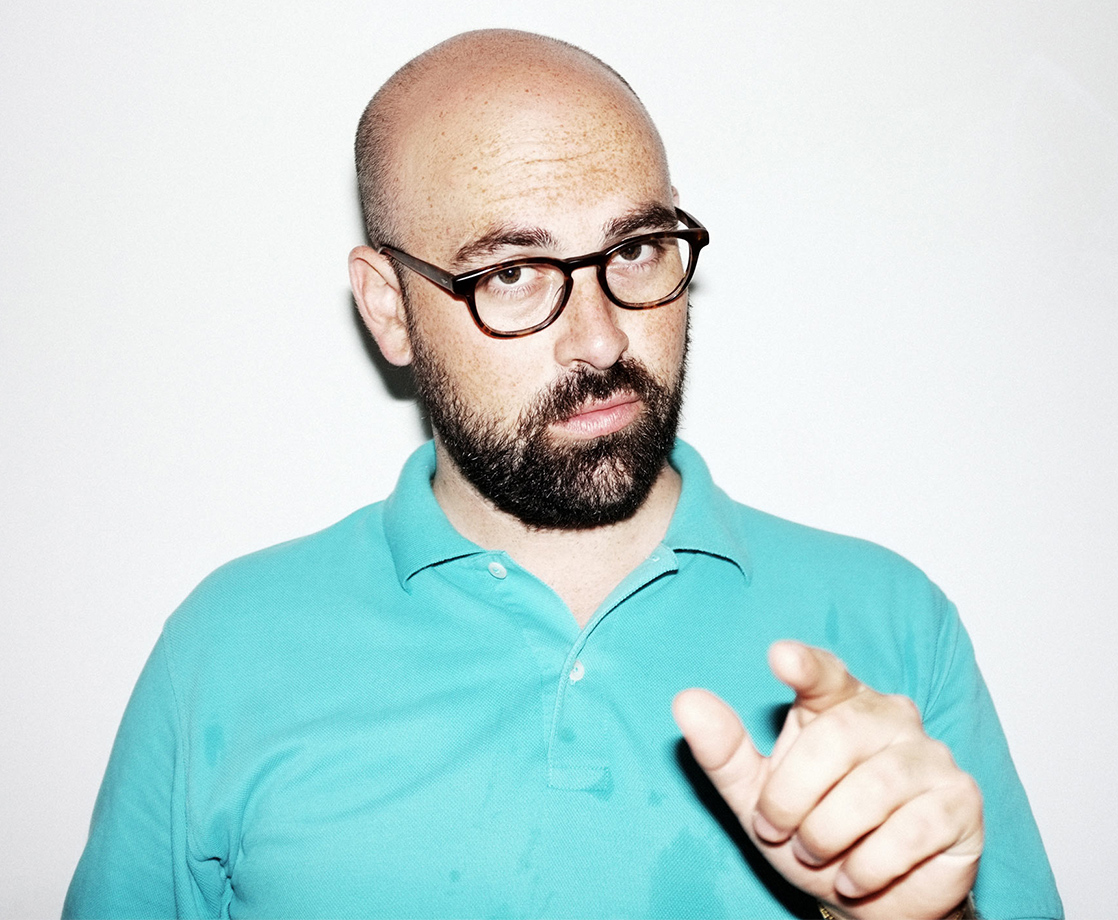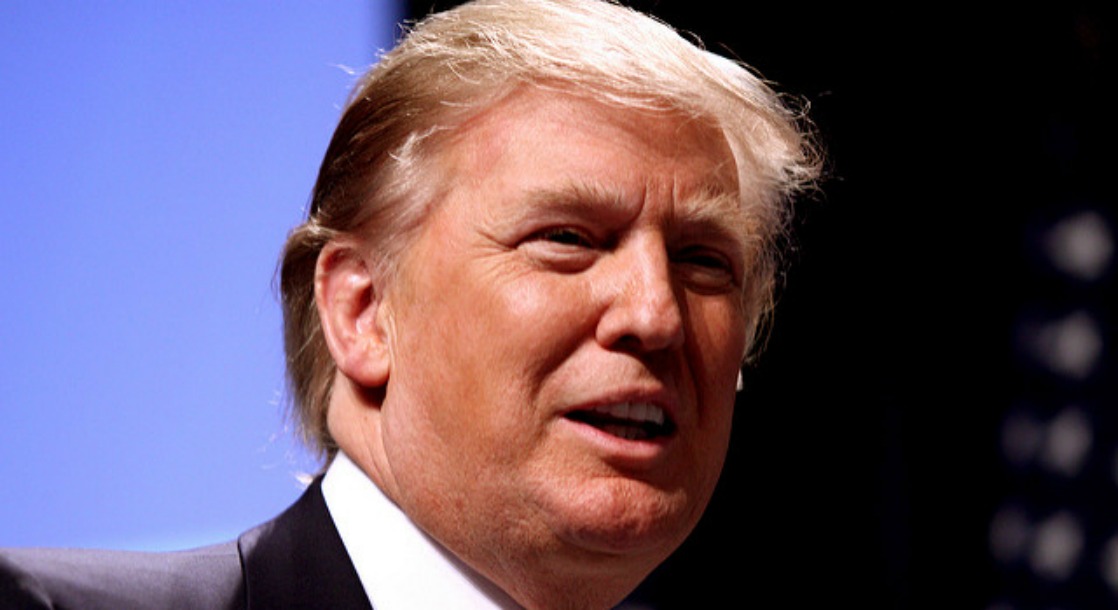Portrait of Aaron Lammer by Anna Rose, courtesy of "Stoner"
“The first time I smoked weed was at the Tibetan Freedom concert in San Francisco, which I want to say was in 1994, but I should probably look that up.” Aaron Lammer shared this colorful anecdote with me on a sunny afternoon in his backyard in Brooklyn. Known for his work as the co-founder of Longform, which showcases the best longform journalism across the media landscape, and also puts out a beloved weekly podcast of the same name, Lammer recently created a new podcast. This time he’s focusing less on, say, the investigative work of a journalist who covered the rise and fall of the man behind the Silk Road, and more on the relationships interesting people have with cannabis. The name says it all: “Stoner.”
Launched in March, the podcast has featured guests such as Krishna Andavolu of Viceland’s show Weediquette, Nick Denton, founder of Gawker Media, and Beca Grimm and Rachel Hortman, creators of Dope Girls Zine. (Beca also has a tasty weekly column here at MERRY JANE.) On top of asking the obligatory “When did you lose you weed virginity?” question, Lammer and company get heady and wax poetic about big-picture topics in the cannabis world, such as the industry’s issues with racism and sexism, parenting and pot, and the persisting stigmas that people associate with regular marijuana users.
While it’s all a blast, the most engrossing parts are often when each guest opens up about their personal ties to THC. It’s the “can’t-make-it-up” stories, not the politics, that drive the show and keep me coming back each week for new hits. Over iced coffee, I chatted with the stoner behind “Stoner” about his own connections to weed, as well as the nuts and bolts, seeds and stems, behind his dank new podcast.
MERRY JANE: What’s your preferred method of intake?
Aaron Lammer: I’m a total joint person. Honestly, a lot of the stuff that’s come out since legalization is wasted on me, like vape pens. I see the convenience, and I usually gravitate towards convenient. I try to be conscious of my own addictive tendencies, and I know that I like a very specific repeated experienced. What I like with weed is a preciously rolled joint, which is a shame because I would like to punish my lungs a little bit less.
How did your new podcast “Stoner” come to be?
I was doing “Longform,” a show I’ve done for about five years and has been successful. It’s taught me about interviewing, how to make an entertaining show, and how to run a podcast like a business. I had interest in doing something around weed; I try to follow my own curiosities. A lot is in the timing. I know from doing “Longform” that [subject matter] where there are big shifts happening tend to be interesting. That’s where the stakes are. That’s where the drama is. That’s where the news is. A lot of people are discussing weed from the perspective of business or politics, and that’s important, but I think that there’s a parallel story that’s probably even more important which is what’s happening personally to people. The way to approach each individual story is to let them tell their own story. That’s my goal with the show.
The listener does learn a lot about each of your guests. How do you pick who you invite to come on?
I don’t learn beforehand if we’re going to learn anything and what that’s going to be. Like the guy we had on [recently], Sebastián Silva, I wasn’t even sure he smoked weed. I had some clues, but I don’t inherently even ask people. If I think there’s something interesting in the story, then it [doesn’t matter]. I had Alexandra Chasin on, who wrote a book about the history of drug prohibition. I had no idea if she smoked weed. It was totally fine if she didn’t. Some of the other people I’d like to know beforehand. The show is a mix of first-hand experience people, and people who work in the industry, and I try to alternate those.
I appreciate that you’ve had some diversity on the podcast.
I feel like it’s a good start, but I’m a little embarrassed that it’s been so lopsidedly male as it is.
It’s better than other podcasts.
I’m not sure that’s the bar I want to hold myself to.
I was impressed that the first episode opened with a woman, Aminatou Sow.
I’ll be honest, that’s a calculated decision, in that I don’t think anyone else is making things that’s really aimed at women. Dope Girls Zine is something, but that’s quarterly and low volume. In terms of the weekly things that are out there, most of them are aimed at white men. So, there’s an opportunity to do something that’s not aimed at white men… despite being a white man and doing it.
You’re doing great work, but what you think of the critiques that white men hijacked the cannabis industry?
I try to not make it about my own opinions because my own opinions would just be exchanged every single week, but I try to ask that question to the guests. I think two things. There’s a strong opinion that the legalization process has minimized the importance of women and people of color. That said, I’m also interested in futurism and predictions. When I say, “Is there any chance that this doesn’t end up being a Marlboro corporate money-making scheme?” every single person is like, “That’s going to happen.” I try to balance those perspectives on the show. I’m curious about both what people think should happen and what people think will happen. Let’s strategize accordingly. Certainly, the big money control over the industry is the natural conclusion. That’s the default. It’s just the natural flow of American commerce. I don’t know why I went from women and people of color to business, but I feel like that’s the flip side of should and could distinction in terms of the ethics of what’s happening.
Sure, we have a shoddy medical marijuana system in New York, but what’s it like making the podcast in a non-legal state?
It’s been a challenge because I like to interview people in person. It’s harder to get people who are willing to talk here. There’s no shortage of people smoking weed in New York, but I’ve been surprised at how many people I thought would be out that aren’t talking about it. I wonder what LA would be like. But each place is different, and that’s part of what the show is trying to reflect. There’s not a single story of what’s happening with weed. What’s happening is very different for men, women, black people, white people, people in New York, LA, and Atlanta.
You mentioned stigma. Did anyone warn against doing a weed podcast?
Yes. People objected to the name. People objected to the approach, not specifically the general idea. They thought it was reinforcing a stereotype. My very basic belief after branding a few internet-y things is that there’s value in directness. I’m trying to find all the people out there who might like the show. So, calling it something subtle, like “Elevate,” is like, good for you, but I’m trying to wave a beacon to someone in Ohio who hasn’t smoked weed since college and is curious. I have to catch people because people aren’t necessarily going to tell their friends about it. Their friends might not even know that they smoke weed. So, I wanted to be direct with the name, and I wanted to be direct with the approach.
What I’m curious about is people who smoke weed and their experiences. The name “Stoner” works for me because I think one of the closest corollaries is the word “nerd.” People with a strong interest in technology were ridiculed and then rebranded the word and themselves, and now it has a connotation that’s positive and people gather around it. A stoner is a person who smokes weed. It’s a show about people who smoke weed. No positive or negative judgement value about that. If I’m going to be worried about that then clearly my guests are. I need to project a confidence if I want other people to open up to me.
You’re right. I recently interviewed someone who insisted on using the term “cannabist.” I felt like I offended him when I said the word “stoner.”
Who decides that? Who decides that there’s a break with the past, and what exactly are you trying to turn your back on? I come from the fundamental belief that people want to smoke weed. There very clearly are medical benefits, there are psychological effects, but beyond and above that the common denominator is that people want to smoke weed. I’m interested in that essential interest and not putting a veneer over it.
I do wish people would just say out loud that they like to get high more.
I think it’s a little bit more radical. To air on the side of medical and scientific respectability is a privilege. “Oh well, a doctor has told me I’m allowed to do this.” I don't think people are really free in this country and [the freedom to smoke weed] is actually unrestricted until people can be honestly out.
I use it medically, but I’m also not going to pretend that I’m getting stoned before seeing Wonder Woman later tonight for reasons that aren’t recreational. You can have both.
People are complicated. I don’t think people draw strict boundaries in their lives around medicine and recreation. Clearly, things like alcohol interact with things like depression, and things like alcohol are also part of partying and entertainment. So, people’s lives are already intertwined. You can’t have a purely medical experience that’s not also a drug experience, I don’t think.
What are your thoughts on legal dispensaries?
I mean it’s fun. I’ve been living in New York since 2003, 2004, so to go jump into the future in that sort of way when it first happened was pretty exciting. I like the convenience that I don’t have to worry about getting weed in those states, but I do think they are a bit of an overwhelming experience for most customers right now. It’s early days, though.
I just had my first legal dispensary experience and was shocked by how high the dosages are in edibles.
I don’t like edibles that much. The weed you can get from California, or anywhere where it’s legal, is just insane. I like to smoke weed slowly over a long period of time. There is so little that’s even in the middle range, in terms of strength, at a dispensary — you really have to seek it out. I do think it was a strange decision to go kind of Everclear with THC amounts. Maybe young people’s tolerance is calibrated to that. To me, someone who smokes weed a pretty good amount, all this stuff is a little stronger than if I would have set it. As a business, to choose ultra-high THC products courts the perception of intoxication far more than like the word “stoner” does. I understand that it’s a connoisseur's market; I just wish it wasn’t so intense. I do think that’s an opportunity in the market.
What do you think of weed dinner parties?
I haven’t been to one, but it seems to me like cooking weed food is an intermediary novelty. To me, the frontier is like people wanting to hang out and be stoned. Buying weed like you would in a bar or a restaurant, where you can chill out and smoke. It sounds ridiculous, but carpets and pillows and good coffee, that’s an enjoyable vibe. Everyone isolated in their own houses isn’t the end goal. The end goal is socializing. I think more and more weed is at parties, but I ultimately there could be different kind of entertainment along those lines. There probably will be as soon as it’s legal to do so.
What’s in the future for “Stoner?”
It totally changes based around legalization. If this project no longer makes sense, then I won’t do it. But there’s an alternate chance that a lot of the country is lighting up for podcasts. I’d like to do more stuff like events along the lines of what we’re talking about. I don’t see it as a podcast; I see it as a way into a community.
You can listen to a new episode of "Stoner" every Tuesday here
Follow Sophie Saint Thomas on Twitter











